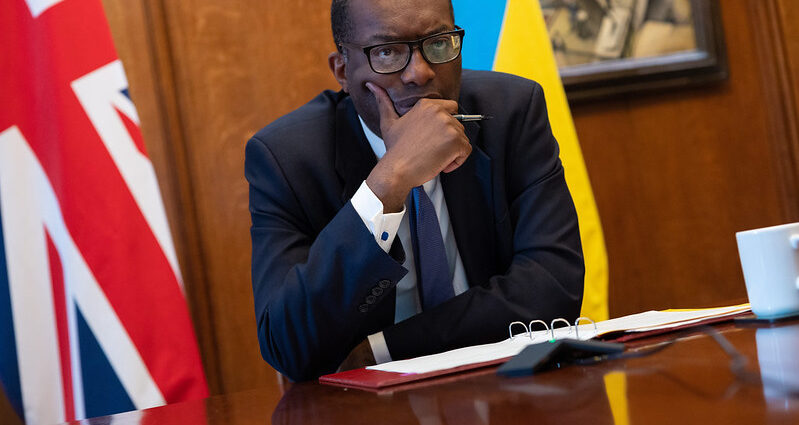Alanya Smith
Chancellor of the Exchequer, Kwasi Kwarteng has ignited a contemporary “class war” with his mini-budget, exacerbating financial struggle across the demography of the United Kingdom.
Yet what does this mean for the stability of British economics, politics, and the communities they represent?
Mini-Budget Announcement
Every year, financial changes made by the Chancellor are announced in a mini-budget. These amendments will affect all British citizens, with aims tailored to reduce any challenges faced during that economic climate. Key announcements this year include:
- Scrapping the 45% tax bracket for high-income earners by 5% to 40%. This means that anybody now earning £50,000 or above will be taxed the same (i.e. if you earn £50,000, you will pay the same personal tax as someone earning £250,000).
- Limits to bonuses given to bankers have been dissolved. The aim is to encourage bankers to stay working in the UK instead of emigrating to work in countries where there are no bonus limits.
- The 1.25% rise in national insurance introduced earlier this year has been scrapped, saving roughly £330 per household.
- Thresholds for first-time buyers paying stamp duty will increase to £425,000 from £300,000. The maximum relief that first-time buyers can claim will also increase to £625,000 from £500,000.
- A planned rise of 6% in corporation tax has been cancelled.
Nearly 2/3 of the gains from personal tax cuts for 2022/23 “will go to the richest fifth of households”. Although Kwarteng has indicated he will allow the Office for Budget Responsibility to review Treasury spending plans before the end of 2022, their input was blocked prior to the mini-budgets’ release.
On dissolving caps on bankers’ bonuses, Kwarteng stated that“High taxes reduce incentives to work and they hinder enterprise”. Kwarteng himself is predicted to earn roughly £150,000.
The mini-budget will inhibit a prior £41 billion in tax revenue. The last time taxes were cut this marginally was in 1972 by Anthony Barber, cutting a total of £52 billion.
Government borrowing will rise to £72 billion in the next six months alone.
Impact on Britons
Following Kwarteng’s announcement, mortgage lenders have suspended offers to new customers following fears of rates rising.
The sterling rate has now enacted a new crisis as it plummets to record lows. The falling of the pound projects a negative image of British economics internationally, which can influence the attitudes and relationships the UK holds with different countries.
BBC commentators have expressed that the pound falling can increase food prices, energy bill pressures, repayment amounts for mortgages and international travel spending. However, this may benefit institutes that sell products abroad.
Liz Truss defended the cuts as “helping ordinary people”, with the intention to boost economic growth by 2.5%. A key critique from financial commentators has been Ms Truss’ absence in interviews following the mini-budget’s announcement.
After appearing on eight local BBC radio stations on Thursday, her answers to vetted questions were described as an ‘”utter disaster“’.
Political Consequences
Only three weeks into her election as Prime Minister, Liz Truss has already received letters of no confidence in her premiership. Such action from parliamentary officials so soon into her election paints a pessimistic landscape of cohesion and collaboration across parties in the House of Commons.
Since being elected, Prime Minister Truss has focused action on the funeral of Queen Elizabeth II and tackling the energy crisis.
UK markets have lost at least $500 billion in combined value since Liz Truss took over as prime minister https://t.co/rFbaWGItIs pic.twitter.com/1RYpGwlANe
— Bloomberg UK (@BloombergUK) September 27, 2022
Keir Starmer has utilised the present controversy of the mini-budget to advance the aims outlined in the annual Labour Party Conference. Such goals included; greater investment into NHS services, prosecuting President Vladimir Putin and establishing a publicly owned UK energy company.
“…an unexpected event that causes this sort of crisis this is self-inflicted.”
Commentating on Kwarteng’s decision-making, Starmer said that “Unlike other situations where it may be a world event, an unexpected event that causes this sort of crisis this is self-inflicted. This was made in Downing Street last Friday.”
Investor confidence has plummeted since the release of the mini-budget, Bloomberg UK states. Since Liz Truss became Prime Minister, UK markets have lost $500 billion.
Featured image courtesy of HM Treasury via Flickr. Image license found here. No changes were made to this image.

